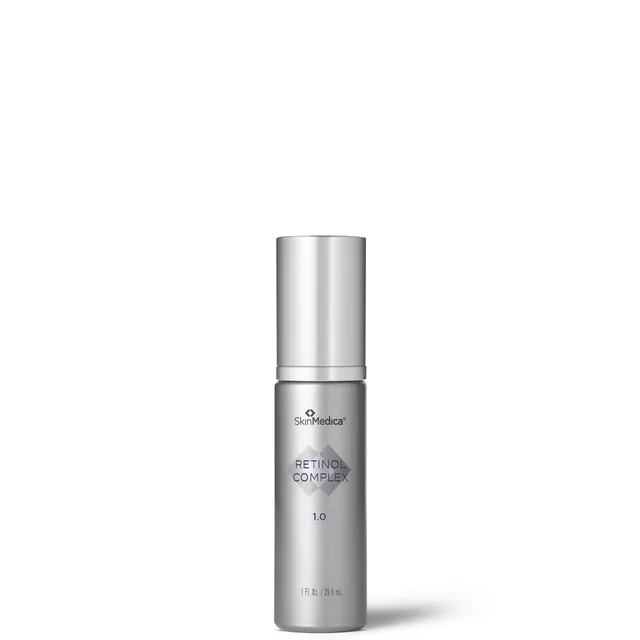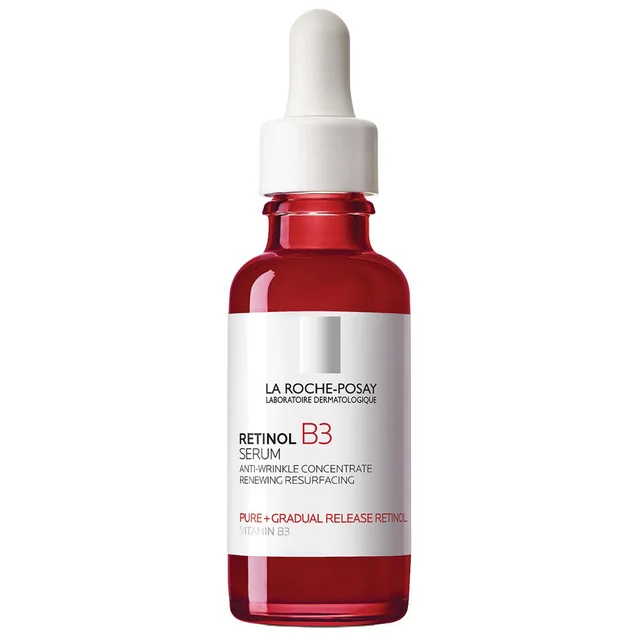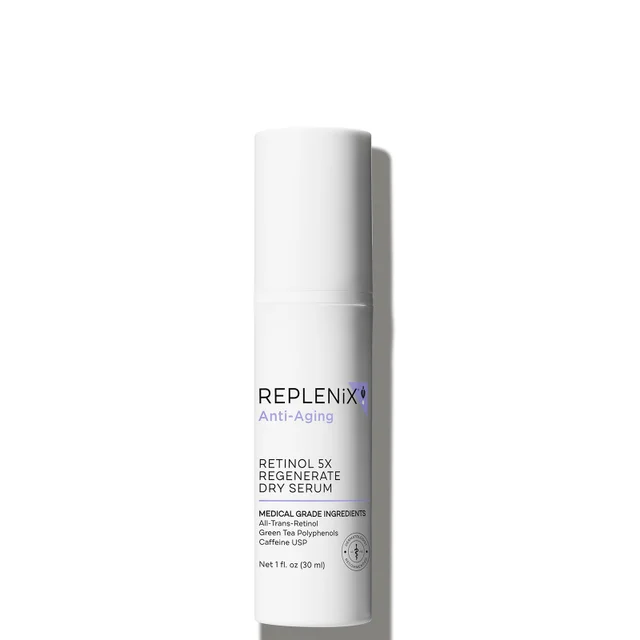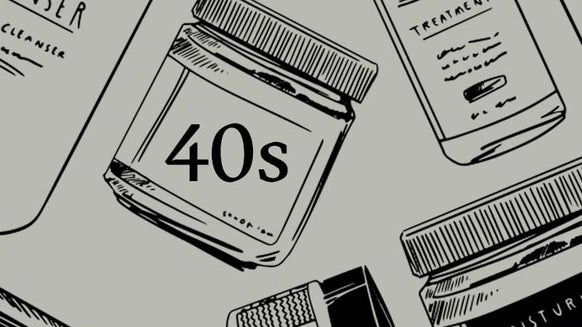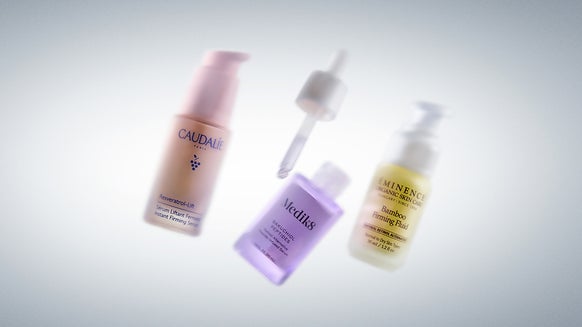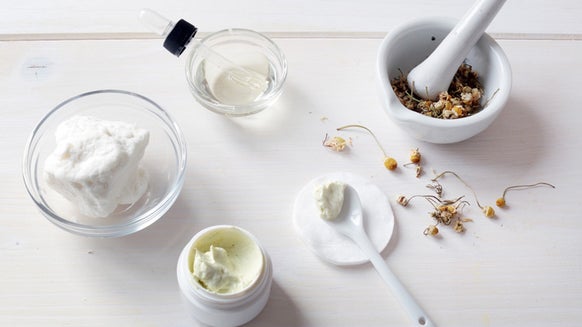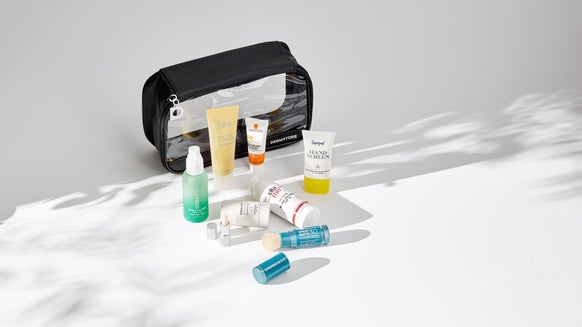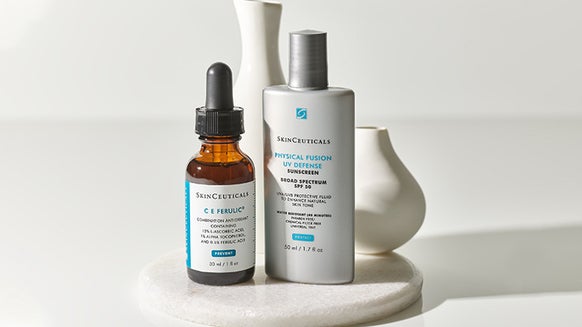Retinol vs Tretinoin: The Ultimate Guide for Choosing the Best Retinoid for Your Skin, According to a Derm
If we’re talking about ingredients that target fine lines, breakouts, and tone and texture issues, then all roads lead to the ultimate skincare MVP: retinoids. Long hailed as the gold standard of skincare, retinoids aren’t just anti-aging superstars but true all-rounders that can dramatically improve the skin’s overall health and appearance. That said, because retinoids differ in potency, how they work, and skin tolerance, it’s not always clear which one belongs in your routine. Take retinol vs tretinoin, for example. As two of the most popular retinoid types, they’re effective, powerful, and definitely not the same thing. So how do you know which one is right for you? Below, a dermatologist explains their benefits and differences to help you decide which retinoid is best suited for your skincare goals.
Meet the Expert
Dr. Ashley Magovern - Board-certified Dermatologist and member of Dermstore's Medical Advisory Board
What are Retinoids
Retinoids, both the prescription and over-the-counter kinds, are compounds that are derived from vitamin A. “They are widely used in dermatology to treat acne, signs of aging, and hyperpigmentation,” says board-certified dermatologist Ashley Magovern, member of Dermstore’s Medical Advisory Board. “The term ‘retinoid’ encompasses a range of products, including retinol, tretinoin, adapalene, and tazarotene.”
Retinoids are highly praised because of their long-standing, clinically proven results. They come in multiple strengths and formulations, and each type is meant to strike a balance between efficacy and skin tolerance. In other words, while all retinoids address the same skin concerns, some types are more targeted, work faster, and more potent than others—and choosing the right one largely depends on what your skin can handle and the specific concern you want to address.
Retinol
Commonly found in skincare products and over-the-counter treatments, retinol works by accelerating cell turnover and boosting collagen production that results in reduced fine lines, wrinkles, and dark spots or hyperpigmentation. Unlike other retinoid types, it must undergo a two-step conversion in the skin before turning into its active form, retinoic acid. This makes retinol less potent and gentler than prescription options, which is why it’s a great choice for beginners or those with sensitive skin.
Tretinoin doesn’t beat around the bush. This prescription retinoid goes straight to work without needing to be converted and delivers noticeable results faster than retinol. Because of its high potency, dermatologists often prescribe tretinoin to clear stubborn and severe acne, soften deep lines and wrinkles, or patients who aren’t seeing their desired results with OTC retinoids. The downside, however, is that new users can struggle to adjust to its strength. This may result in irritation, peeling, and dryness, especially during the first few weeks of use.
Similarities Between Retinol and Tretinoin
As vitamin A derivatives, retinol and tretinoin share plenty of things in common. They both speed up skin cell turnover, stimulate collagen production, and improve skin clarity. “Both can help reduce fine lines, wrinkles, and acne and improve skin texture and tone over time,” says Dr. Magovern.
Retinol Vs. Tretinoin: How They Differ
While both retinol and tretinoin perform the same tasks for your skin, there’s one significant different between them: potency. Tretinoin, also known as pure retinoic acid, is already in its active form, so it doesn’t need to be converted by your skin before it can get to work. This makes tretinoin the stronger and faster-acting retinoid of the two, says Dr. Magovern.
Retinol, on the other hand, must go through a conversion before becoming active. This reduces retinol’s potency and slows down its mechanism, resulting in gradual results instead. However, this also makes retinol better tolerated by sensitive skin types and retinoid newbies. “Retinol is generally milder, causing less irritation and dryness compared to tretinoin,” adds Dr. Magovern. Another key difference? Availability. You can easily find retinol in OTC treatments, serums, and moisturizers, but tretinoin requires a prescription.
How to Choose the Right Retinoid for Your Skin
When choosing between retinol vs tretinoin, Dr. Magovern says it’s important to first consider your skin type, the specific concern you want to address, and your experience with retinoids. Ultimately, the best retinoid for your skin isn’t always about which is stronger or works faster—it’s about which is better for your skin.
Go for low-strength retinol if you are a first-time user, have sensitive skin, want to address mild fine lines, and improve your overall skin tone. As your skin learns to adapt and get accustomed to retinol, you can switch to a higher-strength formula, and eventually, prescription-strength retinoids like tretinoin.
On the other hand, consider tretinoin if you’ve already built a tolerance for lower-strength retinoids and stronger actives, have moderate to severe acne, and need more pronounced anti-aging effects. But because tretinoin is significantly stronger than retinol, you may still experience some redness, flaking, and dryness as part of its adjustment period.
That said, whether you’re dipping your toe for the first time or already a retinoid veteran, it’s always a good idea to pair retinoids with ingredients that can cushion unwanted reactions. Look for retinoid formulas and moisturizers with hyaluronic acid, niacinamide, or ceramides to ensure you don’t overwhelm your skin and compromise your skin barrier.
Best Retinol Skin Care
1. Medik8 Crystal Retinal 6 Serum
This fan-favorite retinoid serum features retinaldehyde as its star ingredient—a next-generation vitamin A that’s 11 times faster than retinol without the added irritation. We love its anti-aging-focused and hydration-infused formula, making things comfortable for your skin and transitioning to higher-strength retinoids a breeze.
Key Ingredients: 0.06% Retinaldehyde, Glycerin, Hyaluronic Acid, Vitamin E
Skin Type: All skin types
Skin Benefit(s): Clinically proven to reduce wrinkles; improves texture, brightness, firmness, and clarity
Beauty Insider Tip: As part of Medik8’s progressive retinoid strengths, Crystal Retinal 6 is a medium-strength formula that’s ideal for skin that’s already built a tolerance for As part of Medik8’s progressive retinoid strengths, Crystal Retinal 6 is a medium-strength formula that’s ideal for skin that’s already built a tolerance forCrystal Retinal 3.
2. SkinMedica Retinol Complex 1.0
With its high concentration of retinol and antioxidants, this expertly formulated anti-aging treatment works hard to support skin renewal. It’s also infused with a calming antioxidant complex that buffers side effects, so you get smoother, younger-looking skin with little to no flaking.
Key Ingredients: Retinol, PhytoShield™ Complex
Skin Type: All skin types
Skin Benefit(s): Refines fine lines and coarse wrinkles, visibly improves tone and texture, improves elasticity, blurs blemishes and acne scars
Beauty Insider Tip: Never been on retinol before? Limit use to twice weekly and gradually increase to every other night. Then, adjust frequency to nightly use or as often as what your skin can tolerate.
3. SkinCeuticals Retinol 1.0
If you’re a seasoned retinoid user looking to level up your routine, then this derm-favorite retinol cream is for you. It zeroes in on wrinkles, sun damaged, and enlarged pores while balancing its potency with a soothing complex to comfort your skin.
Key Ingredients: 1.0% Retinol, Soothing Complex (Chamomile and Frankincense)
Skin Type: Oily, Acne-Prone, Combination, Normal, Mature
Skin Benefit(s): Reduces fine lines, wrinkles, dark spots, and discoloration; prevents acne and tightens pores; minimizes retinol-associated irritation, non-comedogenic
Beauty Insider Tip: This nighttime retinol cream is best for advanced retinol users, so make sure your skin has already built tolerance with lower-strength retinoids. It’s recommended that new users start with SkinCeuticals Retinol 0.3 or 0.5.
4. Obagi Medical 360 Retinol 1.0
With its encapsulated retinol technology, this intensive wrinkle-fighting treatment is all about a slow-and-steady retinol release, ensuring your skin gets maximum anti-aging benefits with minimal irritation.
Key Ingredients: 1.0% Retinol, Jojoba Oil, Shea Butter, Glycerin
Skin Type: All skin types
Skin Benefit(s): Brightens discoloration and fades blemishes, helps treat and prevent acne, improves fine lines, wrinkles, and sagging
Beauty Insider Tip: As with most retinoid users, you may experience mild redness, peeling, or irritation. These are normal reactions as your skin adjusts and builds tolerance. If irritation continues, limit your use to two to three times or every other night until your skin has fully acclimated.
5. PCA Skin Intensive Clarity Treatment 0.5% Pure Retinol
In most cases, mixing retinol with exfoliating acids usually leads to bigger skin drama—but this clarifying treatment is the exception. Like a one-two punch for acne and aging, its breakthrough formula successfully blends salicylic acid and pure retinol to keep breakouts and wrinkles at bay while getting rid of dead skin cells and stimulating cell turnover.
Key Ingredients: 0.5% Retinol, Salicylic Acid, Lactic Acid, Vitamin C, Antioxidants
Skin Type: Acne-Prone, Oily, Combination, Normal
Skin Benefit(s): Clears congested pores, fades discoloration and blemishes, smooths tone and texture, blurs fine lines and wrinkles
Beauty Insider Tip: Designed for nighttime use only, this product makes your skin extra sensitive to the sun during the day, so make sure you always have your sunscreen on (at least SPF 30).
6. La Roche-Posay Retinol B3 Serum
This anti-aging serum has nothing but results and your skin’s comfort in mind. Featuring time-released pure retinol and soothing niacinamide, it eases fine lines, wrinkles, and sun damage without triggering discomfort, sensitivity, and irritation.
Key Ingredients: Pure Retinol, Niacinamide, Hyaluronic Acid, Glycerin
Skin Type: All skin types
Skin Benefit(s): Reduces signs of aging and sun damage over time, improves hydration and overall skin radiance, fades discoloration, supports and restores the moisture barrier
Beauty Insider Tip: Pure retinol can react once it comes into contact with air, resulting in a slight change of color in the product (a yellowish hue). Don’t worry though as this doesn’t affect its tolerance or efficacy.
7. Replenix Retinol 5x Regenerate Dry Serum
Lightweight and packed with antioxidants, this anti-aging serum enhances your skin’s natural processes to continuously boost your skin health—thanks to its patent-pending delivery system that releases retinol gradually to skin. It reduces signs of aging, prevents sun damage, and counters oxidative stress.
Key Ingredients: Retinol, Caffeine, Green Tea, Hyaluronic Acid
Skin Type: All skin types
Skin Benefit(s): Diminishes fine lines and wrinkles, fades dark spots and discoloration, protects against environmental damage
Beauty Insider Tip: This serum is formulated for acclimated skin, so we recommend starting with the lowest dose and working your way up to prevent irritation.
8. MZ Skin Advanced 3% Retinol Complex Serum
Science meets luxury in this fast-acting serum that features a powerful retinoid blend and bakuchiol, breathing new life into your skin and promoting a healthier, more radiant, and younger-looking complexion.
Key Ingredients: Retinol, Bakuchiol, Glycerin
Skin Type: Oily, Acne-Prone, Combination, Normal
Skin Benefit(s): Smooths and evens tone and texture, firms and lifts sagging skin, visibly reduces fine lines and wrinkles, clears and prevents acne
Beauty Insider Tip: If you’re using retinol for the first time, start with one to two times a week and slowly increase to build tolerance. If you have sensitive skin, layer or mix with a hyaluronic acid serum or moisturizer to soften potency.
9. Medik8 Crystal Retinal 3 Serum
New to retinoids? This one’s for you. With gentle retinaldehyde and barrier-supporting hydrators at the helm, this serum gives your skin the perfect introduction to retinoids: it delivers real, noticeable results while comfortably easing your skin to build tolerance for higher-strength formulas.
Key Ingredients: 0.03% Retinaldehyde, Glycerin, Hyaluronic Acid
Skin Type: All skin types
Skin Benefit(s): Improves tone and texture, supports elasticity, minimizes fine lines and wrinkles, hydrating
Beauty Insider Tip: While Crystal Retinal 3 comes in a beginner-friendly strength, it’s still important to exercise care when using retinol for the first time. That means starting slowly (once to twice a week, then gradually increasing frequency) and making sure you protect your skin with SPF during the day.
10. Dr. Diamond’s Metacine INSTAFACIAL EMULSION RETINOPRO Growth Factor Night Cream
As nourishing as it is powerful, this doctor-formulated pro-grade emulsion combines retinol, growth factors, and skin-loving hydrators to give your skin the most luxurious pampering and rejuvenation. By boosting cell renewal and collagen production, you’ll soon be waking up to plumper, smoother, and firmer skin in no time.
Key Ingredients: Bioactive Retinoids, Bioidentical Growth Factors, Peptides, Niacinamide, Hyaluronic Acid Complex
Skin Type: All skin types
Skin Benefit(s): Firms and lifts sagging skin, brightens discoloration and enhances radiances, smooths and refines texture
Beauty Insider Tip: Pair this emulsion with Dr. Diamond’s Metacine INSTAFACIAL PLASMA and use nightly for dramatic, clinically proven results.
FAQs
Which is better, retinol or tretinoin
According to Dr. Magovern, choosing between retinol vs tretinoin depends on your skin goals and tolerance. “Retinol is considered safer for sensitive skin or those new to retinoids as it’s less likely to irritate. Tretinoin, while highly effective, can cause dryness, redness, and peeling, particularly in the early stages of use.”
Although retinol works slower than higher-strength retinoids, Dr. Magovern says it still yields visible results, particularly in improving skin texture and fine lines over time. “Consistency and long-term use are key for noticeable changes,” adds Dr. Magovern.
What is the strongest retinoid you can buy over-the-counter?
In the U.S., non-prescription retinoids don’t go any higher than 1.0% concentration, says Dr. Magovern. “Higher strengths may contain retinaldehyde or granactive retinoid for increased efficacy while still being less potent than tretinoin.”
Why do dermatologists recommend tretinoin?
Tretinoin earns the approval of many dermatologists because of the extensive research and trials that support its effectiveness in treating acne, fine lines, and hyperpigmentation as well as its ability to improve overall skin health. “Its potency makes it a reliable option for more dramatic results. It really is the gold standard. People who use tretinoin consistently for years have dramatically younger-looking skin,” explains Dr. Magovern.
The Bottom Line
Choosing between retinol vs tretinoin isn’t about picking one winner. According to Dr. Magovern, the right retinoid is one that your skin can handle comfortably while helping you achieve your skin goals. If you’re new to retinoids, retinol is a solid starting point—especially if you have sensitive skin—as it can help maintain your skin’s overall health with minimal irritation. Tretinoin, on the other hand, is ideal for more stubborn concerns and advanced retinoid users that need faster and more noticeable results. But regardless of your choice, Dr. Magovern says it’s crucial to prioritize consistency, sun protection, and listening to your skin.

Janeca Racho is a Journalism graduate with over 15 years of writing experience. After getting her start in public relations and advertising, she made the switch to freelance writing and began working for various lifestyle, fashion, and travel brands. Her love for all things skincare has led her to beauty reporting and research for the last ten years. Writing for several hair and beauty blogs, she reports on anti-aging staples, trending brands and products, must-have ingredients, and health and wellness.
Related Posts
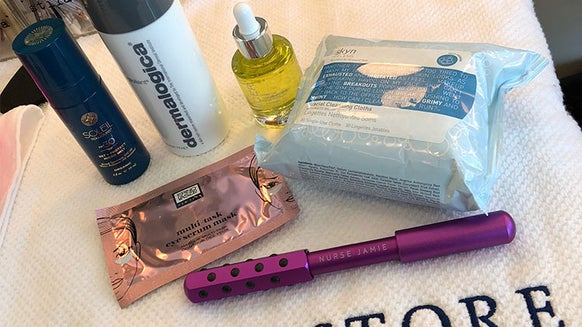
These Are the Beauty Products Used Backstage at Rachel Zoe’s 2018 Pre-Show Event


